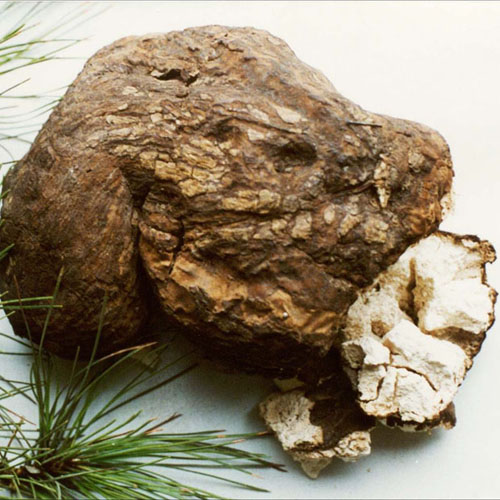|
Used for over 2,000 years, Chinese Poria (Sclerotium poriae cocos) is commonly used in many clinical formulas but also the production of numerous Chinese patent medicines. Poria is now available to everyone, not just the royal families of China.
The common form of poria fungus is its sclerotium, most of which are in the shape of irregular chunk, sphere, oblong, or oval. The skin is grayish brown or dark brown, in the shape of shrinking tumor, white with slightly pin inside, and composed of numerous hyphae. Fruiting body looks like mushroom, 0.5 to 2mm in diameter. Main chemical constituents of poria sclerotium:
Poria cocos benefits Poria cocos fungus has a long history of being used medicinally in China. Since ancient times people are accustomed to grinding it into powder as medicine or for health care by consuming it on daily basis. Due to the expensive production cost, very few families could afford it. Now we have a different story. This herb is so economical and practical that everyone is entitled its health benefits. Modern Pharmacological Actions 1. Chronic Kidney Disease. In the research presented by Sensuke Konno, Ph.D., Department of Urology, New York Medical College. Twenty-six million Americans suffer from chronic kidney disease, with three million new cases each year. There is no known direct cause for chronic kidney disease, but those with diabetes and high blood pressure are at an elevated risk. Poria may have the potential to help many people, a bioactive extract of Poria cocos was tested on epithelial cell cultures. The study’s hypothesis was that if kidney disease is triggered by oxidative stress, Poria, as an antioxidant, would protect the epithelial cells against free radicals. Results showed that cell viability was increased by 25% when cell cultures were exposed to oxidative stress and the severity of oxidative stress was even reduced by 35%. In addition, Poria partially prevented the disruption of the cell cycle which also results from oxidative stress. 2. Antibacterial effect: If you take a look Poria’s properties such the caprylic acid, lauric acid, caprylate. These are known antivirals, antibacterials and antifungals. Yes, a fungus such as mushroom can be used to fight…fungus! More research on this herb is ongoing, but it shows tremendous promise. 3. Effects on the digestive system: This herb can directly relax the isolated rabbit intestine, prevent pylorus ligation-induced gastric ulcer in rats, and reduce stomach acid. This could help millions of people who suffer with H. Pylori bacteria. Most of the antibiotic therapies to combat this bacteria are usually ineffective leading to overuse of powerful antibiotics. 4. Blood Sugar and Congestive Heart Failure: It can lower blood sugar. Its tincture and infusion can inhibit the isolated toad heart. Poria cocos extract by ether or ethanol can strengthen cardiac contractility. But it showed no antiemetic effect to digitalis induced vomiting. 5. Alzheimer's Disease: Preliminary research shows that poria may help fight Alzheimer's disease. In a 2009 study published in the German journal Die Pharmazie, tests on rat cells demonstrated that poria may inhibit Alzheimer's development by reducing oxidative stress. 6. Cancer: Several studies on human cells indicate that poria may possess anti-tumor properties and could help fight some forms of cancer (including pancreatic and breast cancer). However, more research is needed to see if poria can aid in cancer prevention. Tradition Chinese medicine (TCM) believes that this herb is sweet and tasteless in flavor and neutral in properties. It covers meridians of heart, lung, spleen, and kidney. Its key functions are percolating dampness and disinhibiting water, strengthening the spleen and stomach, and tranquilizing heart and soothe the nerves. Vital poria uses and indications include difficult urination, edema-induced swelling, choking cough caused by phlegm and retained fluid, vomiting, reduced appetite due to spleen deficiency, diarrhea, palpitations, anxiety, insomnia, forgetfulness, and nocturnal emission, gonorrhea, and so on. Recommended dosage is from 10 to 15 grams in decoction. Poria is available on the American market by Mushroom Wisdom, a company whose main focus is on intense research on the use of Chinese Medicinal Mushrooms.
0 Comments
Your comment will be posted after it is approved.
Leave a Reply. |
Archives
May 2022
|

 RSS Feed
RSS Feed